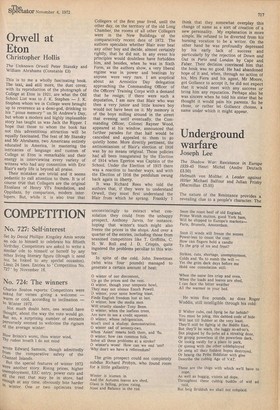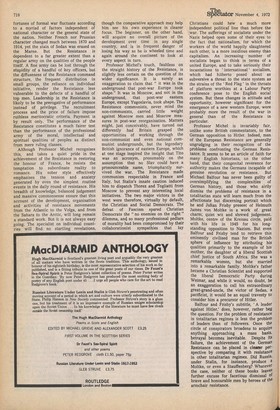Underground warfare
Joseph Lee
The Shadow War: Resistance in Europe 1939-45 Henri Michel (Andre Deutsch £3.50) Helmuth von Moltke: A Leader against Hitler Michael Balfour and Julian Frisby (Macmillan £5.95) The nature of the Resistance provides a revealing clue to a people's character. The fortunes of formal war fluctuate according to a myriad of factors independent of national character or the general state of the nation. Neither French nor Prussian character changed much between 1870 and 1914, yet the stain of Sedan was erased on the Marne. But the Resistance is dependent to a far greater extent than a regular army on the qualities of the people itself. A fine army can be lost through the stupidity of a handful of key officers, but the diffuseness of the Resistance command structure, the frequent distribution in small groups, the reliance on individual initiative, render the Resistance less vulnerable to the defects of a handful of top men. Leadership in the Resistance is likely to be the prerogative of performance instead of privilege. The recruitment process and the price of failure impose ruthless meritocratic criteria. Payment is by result only. The performance of the Resistance constitutes a much fairer test than the performance of the professional army of the moral, intellectual and spiritual qualities of peoples as distinct from mere ruling classes.
Although Professor Michel recognises this, and takes a quiet pride in the achievement of the Resistance in restoring the honour of France, he resists the temptation to subordinate reality to romance. His sober style effectively emphasises the tension and anxiety generated by even the simplest routine events in the daily round of resistance. His breadth of knowledge, balanced judgement and massive commonsense ensure that this account of the development, organisation and activities of resistance movements from the Atlantic to the Volga, and from the Sahara to the Arctic, will long remain a standard work. But it is not always easy going. The specialist on individual countries will find no startling revelations, though the comparative approach may help him see his own experience in clearer focus. The beginner, on the other hand, will acquire no overall picture of the development over time in any single country, and is in frequent danger of losing his way as he is wheeled time and again around the continent to look at every aspect in turn.
Professor Michel's touch, faultless on the straight history of the Resistance, is slightly less certain on the question of its wider significance. It is surely an exaggeration to claim that " it was in the underground that post-war Europe took shape." It was in Moscow, and not in the underground, that post-war eastern Europe, except Yugoslavia, took shape. The Resistance communists, never mind the non-communists, carried little weight against Moscow men and Moscow measures in post-war reorganisation. Matters might, just conceivably, have turned out differently had Britain grasped the opportunities of working through the non-communist and even national communist undergrounds, but the legendary British ignorance of eastern Europe, which at one stage inspired the insight that Tito was an acronym, presumably on the assumption that no Slav could have a pronounceable name, triumphantly survived the war. The Resistance made communism respectable in France and Italy, but Stalin's innate caution induced him to dispatch Thorez and Togliatti from Moscow to prevent any interesting local initiatives. The two major victors in the west were therefore, virtually by default, the Christian and Social Democrats. The defeat of Fascism spared Christian Democrats the "no enemies on the right" dilemma, and so many professional pedlars of morality had been compromised by their collaborationist sympathies that lay
Christians could hew a much more independent political line than before the war. The sufferings of socialists under the Nazis helped open some of their eyes to the fact that nationalism, for which the workers of the world happily slaughtered each other, is a more insidious enemy than capitalism. An increasing number of socialists began to think in terms of a united Europe, and to take seriously their incantations to ' international ' socialism, which had hitherto posed about as subversive a threat to the state system as the strains of the 'Red Flag ' in the throats of platform worthies at a Labour Party conference pose to the English social system. But these changes in attitude and opportunity, however significant for the emergence of a new western Europe, were probably more the result of the war in general than of the Resistance in particular.
Professor Michel is invariably fair, unlike some British commentators, to the German opposition to Hitler. Indeed, men of the European Resistance are generally ungrudging in their recognition of the problems confronting the German Resistance. It seems to be an article of faith for many English historians, on the other hand, that their congenital reverence for authority makes the Germans incapable of genuine revolution or resistance. But Michael Balfour has never been guilty of oversimplifying the complexities of German history, and those who airily dismiss the problems of resistance in a totalitarian state will learn much from the affectionate but discerning portrait which he and Julian Frisby present of Helmuth James von Moltke in a work of great charm, quiet wit and shrewd judgement. Moltke, centre of the Kreisau circle, paid with his life in 1945 for his longstanding opposition to Nazism. But even Balfour and Frisby tend to retrieve this eminently civilised man for the British sphere of influence by attributing his qualities primarily to the example of his mother, the daughter of a liberal Scottish chief justice of South Africa. She was a remarkable women, but she married into a remarkable family. Moltke's father became a Christian Scientist and supported the liberal Democratic Party during Weimar, and while it would, no doubt, be an exaggeration to call his extraordinary great-grand-uncle, the victor of Sedan, a pacificist, it would be an equal travesty to consider him a precursor of Hitler.
Balfour and• Frisby's subtitle, 'A leader against Hitler,' does, however, rather beg the question. For the problem of resistance in totalitarian regimes is less the problem of leaders than of followers. Once the circle of conspirators broadens to acquire anything approaching a mass basis, betrayal becomes inevitable. Despite its failure, the achievement of the German Resistance can be placed in clearer perspective by comparing it with resistance in other totalitarian regimes. Did Russia. under Stalin, for instance, produce a Moltke, or even a Stauffenberg? Whatever the case, neither of these books leaves further excuse for facetious dismissal of brave and honourable men by heroes of the armchair resistance.









































 Previous page
Previous page